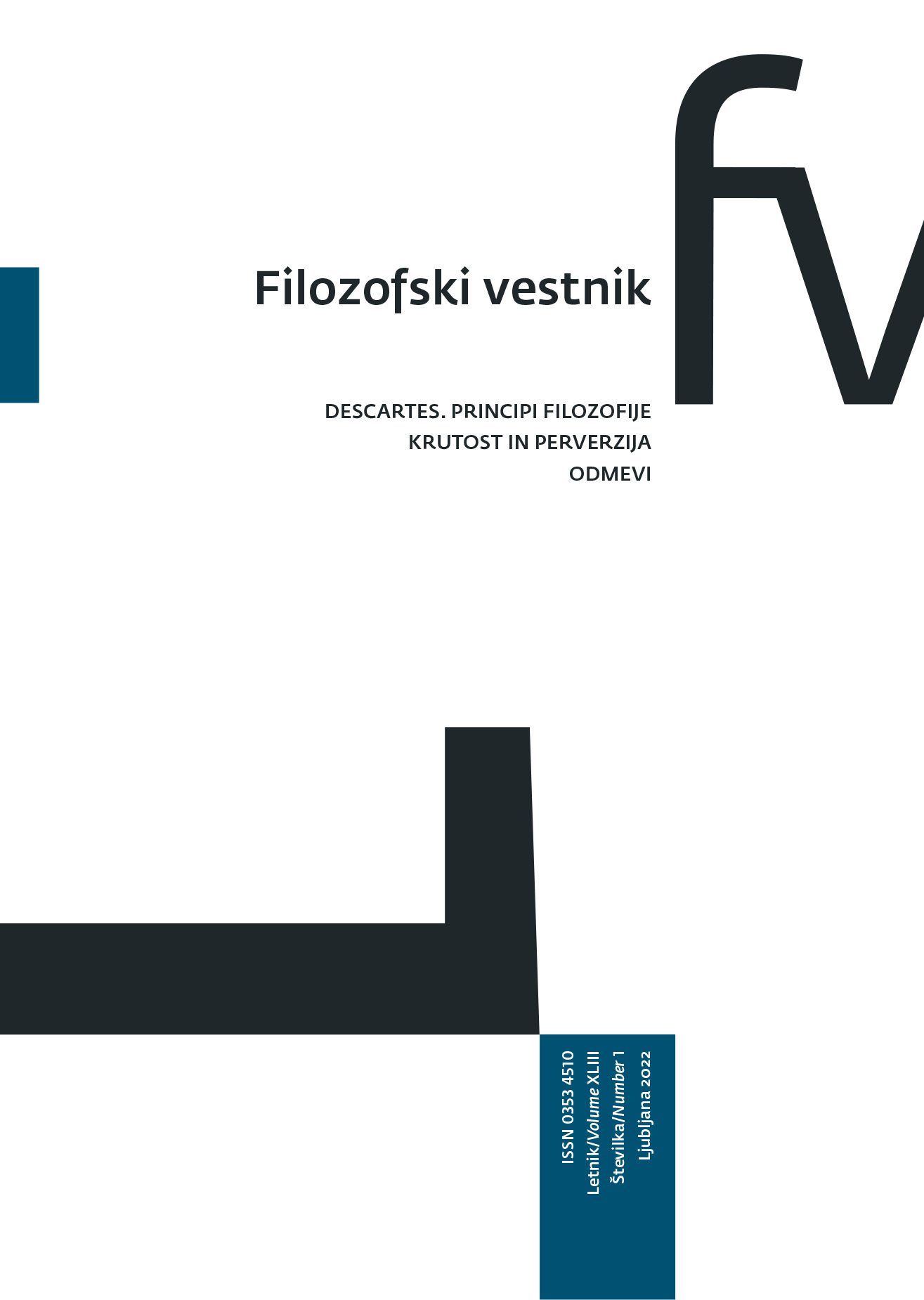Nietzsche, krutost, mazohizem, genealogija
DOI:
https://doi.org/10.3986/fv.43.1.04Ključne besede:
Nietzsche, krutost, mazohizem, genealogija, človeški spomin, slaba vest, DostojevskiPovzetek
Prispevek se prvenstveno posveča Nietzschejevi obravnavi okrutnosti, ki v številnih bistvenih pogledih predstavlja nenadomestljiv ključ za razumevanje Nietzschejevega genealoškega projekta. Ta študija je dopolnjena z vzporednicami s še dvema izstopajočima intelektualnima figurama poznega devetnajstega stoletja: Fjodorjem Mihajlovičem Dostojevskim in Leopoldom von Sacher-Masochom. Dostojevski je zapisal: »če človek zaradi civilizacije ni postal bolj krvoločen, je postal pa vsaj huje, odvratneje krvoločen.« Nietzsche je šel v tej oceni še korak dlje: ne le, da nas civilizacije ne naredi imune za okrutnost, pač pa je treba dojeti kako se sama, na vseh svojih odločilnih korakih, neposredno izrašča iz okrutnosti. Kar Nietzscheja po drugi strani povezuje z Masochom, je dejstvo, da vsi ti zgodovinski in celo predzgodovinski procesi, ki so izoblikovali človeštvo in civilizacijo, niso samo povezani z okrutnostjo, temveč jih moramo razumeti kot različne oblike ponotranjenja (»poduhovljenja«, »božanstvenja«) okrutnosti. Jedro študije je posvečeno analizam različnih oblik in vidikov Nietzschejevega koncepta ponotranjenje okrutnosti (v relaciji do razmerij moči, razmerja subjekt-objekt, mutacij užitka in perverzij).
Prenosi
Literatura
Badiou, Alain, Dvajseto stoletje, prev. A. Žerjav, Ljubljana, Društvo za teoretsko psihoanalizo, 2005.
Bunta, Aleš, “In Times of ʻChastity’: An Inquiry into Some Recent Developements in the Field of Perversion”, Filozofski vestnik, 42 (1/2021), str. 245–263. doi: 10.3986/fv.42.1.11
Del Caro, Adrian, »Nietzsche, Sacher-Masoch, and the Whip«, German Studies Review, 21 (2/1998), str. 241–261. https://doi.org/10.2307/1432204
Deleuze, Gilles, »Predstavitev Sacherja-Masocha: Hlad in krutost«, prev. A. Zupančič, v: Mazohizem in zakon, Ljubljana, Društvo za teoretsko psihoanalizo, 2000, str. 11–100.
Dostojevski, Fjodor Mihajlovič, Zapiski iz podtalja, prev. U. Zabukovec, Ljubljana, Beletrina, 2017.
Earhart, Byron H., »Ishikozume Ritual Execution in Japanese Religion, Epsecially in Shugendõ«, Numen, 13 (2/1966), str. 116–127. https://doi.org/10.2307/3269418
Nietzsche, Friedrich, Onstran dobrega in zlega. H genealogiji morale, prev. J. Moder, T. Bizjak, Ljubljana, Slovenska matica, 1988.
Nietzsche, Friedrich, Jutranja zarja, prev. A. Leskovec, Ljubljana, Slovenska matica, 2004.
Nietzsche, Friedrich, »Fragmenti iz zapuščine: pomlad – jesen 1881 [odlomki]«, prev. T. Troha, Filozofski vestnik, 43 (3/2021), str. 7–24.
Sacher-Masoch, Leopold von, Venera v krznu, prev. U. Cetinski, v: Mazohizem in zakon, Ljubljana, Društvo za teoretsko psihoanalizo, 2000, str. 103–215.
Sacher-Masoch, Leopold von, »Spomin iz otroštva in refleksija o romanu«, prev. A. Zupančič, v: Mazohizem in zakon, Ljubljana, Društvo za teoretsko psihoanalizo, 2000, str. 217–219.
Sacher-Masoch, Leopold von, »Pogodba med Sacher-Masochom in Wando von Dunajev«, prev. U. Cetinski, v Mazohizem in zakon, Ljubljana, Društvo za teoretsko psihoanalizo, 2000, str. 221–223.
Šestov, Lev, Dostojevski in Nietzsche, prev. B. Kraševec, v: Lev Šestov, Dostojevski in Nietzsche, Premagovanje samorazvidnosti, Ljubljana, Literarno-umetniško društvo Literatura, 2002.
Zupančič, Alenka, Nietzsche: filozofija dvojega, Ljubljana, Društvo za teoretsko psihoanalizo, 2001.
Prenosi
Objavljeno
Kako citirati
Številka
Rubrike
Licenca
Avtorske pravice (c) 2022 Avtorji

To delo je licencirano pod Creative Commons Priznanje avtorstva-Nekomercialno-Brez predelav 4.0 mednarodno licenco.
Avtorji jamčijo, da je delo njihova avtorska stvaritev, da v njem niso kršene avtorske pravice tretjih oseb ali kake druge pravice. V primeru zahtevkov tretjih oseb se avtorji zavezujejo, da bodo varovali interese založnika ter da bodo povrnili morebitno škodo.
Podrobneje v rubriki: Prispevki





